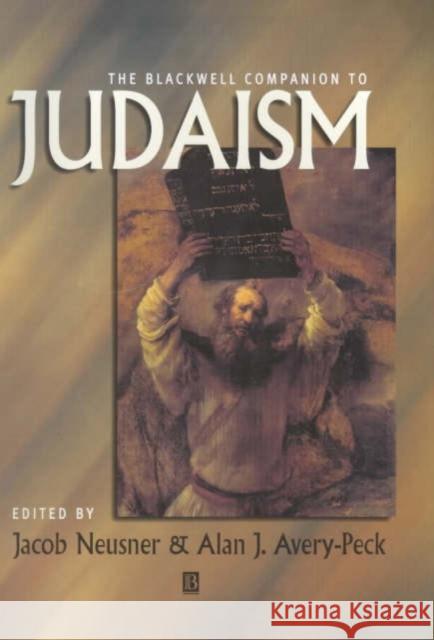The Blackwell Companion to Judaism » książka



The Blackwell Companion to Judaism
ISBN-13: 9781577180586 / Angielski / Twarda / 2000 / 576 str.
The Blackwell Companion to Judaism
ISBN-13: 9781577180586 / Angielski / Twarda / 2000 / 576 str.
(netto: 800,08 VAT: 5%)
Najniższa cena z 30 dni: 834,92
ok. 30 dni roboczych.
Darmowa dostawa!
This Companion explores the history, doctrines, divisions, and contemporary condition of Judaism.
- Surveys those issues most relevant to Judaic life today: ethics, feminism, politics, and constructive theology
- Explores the definition of Judaism and its formative history
- Makes sense of the diverse data of an ancient and enduring faith
The Blackwell Companion to Judaism is a formidable attempt, in a series of learned and elegant essays, to tackle the many questions concerning Judaism. The organization is commendably lucid. The style throughout is accessible to a wide readership, without sacrifice to standards of accuracy and analysis.
Times Literary Supplement
Where the Companion scores highly over other similar works is that the editors have been able to elicit contributions that contain the latest scholarship or position on each subject, so that the contemporaneity and the quality of each is perfectly dovetailed. This will be the benchmark by which future examples of the genre will be measured.
The Expository Times
I am excited at the prospect of the publication of this book, in that it promises to display the lifelong fruits of research and mature insights of a master scholar on Judaism.
Kenneth Hart Green, University of Toronto
"[T]he contributors place Judaism in historical context, elaborate on its principal doctrines, introduce forms of modern and contemporary Judaism, and shed light on special topics in understanding contemporary Judaism, such as ethics, women theopolitical aspects, secular forms of Jewishness, and Zionism."
Journal of Contemporary Religion
"Comparative, comprehensive and highly readable, Matthewes′ book provides an overview of religious ethics in three traditions without sacrificing the specificity of each ethical system. The author effortlessly enlightens the reader as to how Judaism, Christianity and Islam deals with highly relevant topics such as family, love, sexuality, lying, war, capital punishment and many more themes in a provocative and graceful manner."
Ebrahim Moosa, Duke University
Contributors.
Preface.
Part I: The History of Judaism:.
1. Defining Judaism: Jacob Neusner (University of South Florida and Bard College).
2. The Religious World of Ancient Israel to 586: Marvin Sweeney (Claremont School of Theology and Claremont Graduate University).
3. Judaism and the Hebrew Scriptures: Philip R. Davies (Sheffield University).
4. Second Temple Judaism: Frederick J. Murphy (College of the Holy Cross).
5. The Formation of Rabbinic Judaism, 70–640 C.E: G—nther Stemberger (Universitat Wien).
6. The Canon of Rabbinic Judaism: Jacob Neusner (University of South Florida and Bard College).
7. Judaism and Christianity in the Formative Age: Bruce D. Chilton (Bard College).
8. Judaism in the Muslim world: Sara Reguer (Brooklyn College of the City University of New York).
9. Judaism in Christendom: David R. Carr (University of South Florida).
10. Philosophy in Judaism: Two Stances: Daniel Breslauer (University of Kansas). 11. Jewish Piety: Tzvee Zahavy (Fairleigh Dickinson University).
Part II: The Principal Doctrines of Judaism:.
12. The Doctrine of Torah: Jacob Neusner (University of South Florida and Bard College).
13. The Doctrine of God: Alan J. Avery–Peck (College of the Holy Cross).
14. The Doctrine of Israel: Jacob Neusner (University of South Florida and Bard College).
15. The Doctrine of the Messiah: William Scott Green (University of Rochester).
16. Language as Doctrine: Hebrew: David Aaron (Hebrew Union College–Jewish Institute of Religion).
Part III: Modern and Contemporary Judaisms:.
17. Reform Judaism: Dana Evan Kaplan (University of Wisconsin–Milwaukee).
18. Orthodox Judaism: Benjamin Brown (Hebrew University).
19. Conservative Judaism: The Struggle Between Ideology and Popularity: Daniel Gordis (University of Judaism).
20. New Age Judaism: Jeffrey K. Salkin (Port Washington, New York).
Part IV: Special Topics in Understanding Judaism:.
21. Ethics of Judaism: Elliot Dorff (University of Judaism).
22. Women in Contemporary Judaism: Judith Baskin (University at Albany, State University of New York).
23. Judaism as a Theopolitical Phenomenon: Daniel J. Elazar (Jerusalem Center For Public Affairs).
24. Theology in Contemporary Judaism: Neil Gillman (Jewish Theological Seminary).
25. Secular Forms of Jewishness: Paul Mendes–Flohr (Hebrew University).
26. Judaism and Zionism: Yosef Gorney (Tel Aviv University).
27. The "Return" to Traditional Judaism at the End of the Twentieth Century: Cross Cultural Comparisons: M. Herbert Danzger (City University of New York).
Abbreviations.
Index.
Jacob Neusner is Distinguished Research Professor of Religious Studies at the University of South Florida and Professor of Religion at Bard College. He has seven honorary degrees, fourteen academic medals and has published more than 800 books.
Alan J. Avery–Peck is Kraft–Hiatt Professor in Judaic Studies at The College of the Holy Cross. His has published widely and is editor of the journal The Annual of Rabbinic Judaism: Ancient, Medieval and Modern.
This
Companion explores the history, doctrines, divisions, and contemporary condition of Judaism. It organizes and places into context the history of Judaism from ancient through modern times, identifies and expounds some of Judaism′s principal doctrines, introduces the more important forms of modern and contemporary Judaism, and takes up topics of special interest in contemporary Judaic life.
The 27 contributions to this Companion and the selections in the associated Blackwell Reader in Judaism illustrate important points, with primary sources complementing the exposition. In this way, the editors talk about Judaism and let Judaism speak for itself. All the contributors, experts in their field, address a broad audience, assuming an interest in the subject but no prior knowledge. They present introductions for any reader interested in the subject, and do not take partisan or sectarian positions.
This volume will guide those curious about the past and present of a vital religious tradition that has exercised influence far beyond its own community.
1997-2026 DolnySlask.com Agencja Internetowa
KrainaKsiazek.PL - Księgarnia Internetowa









